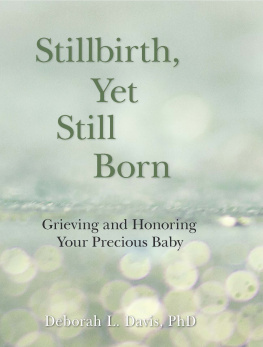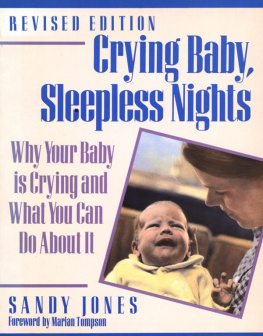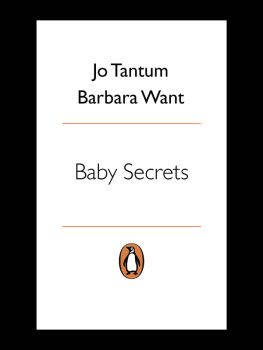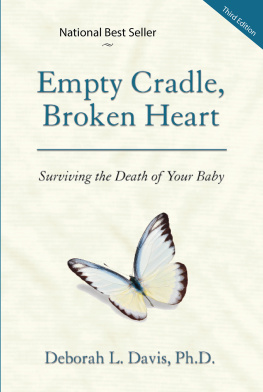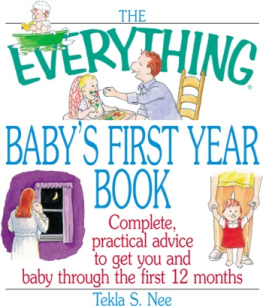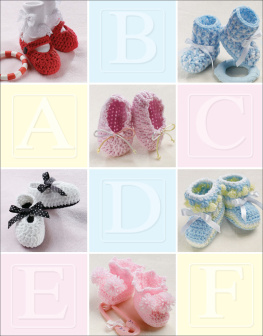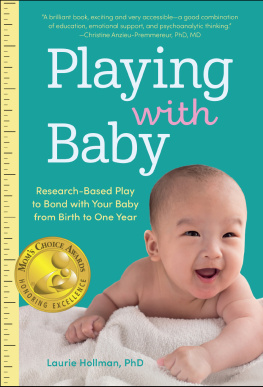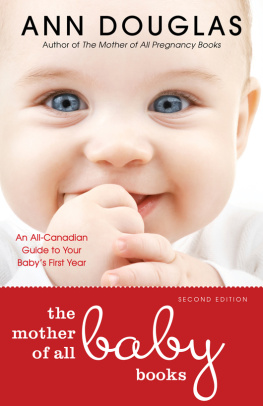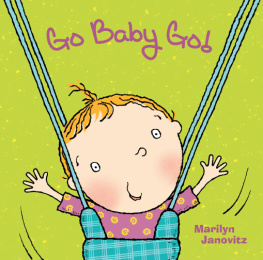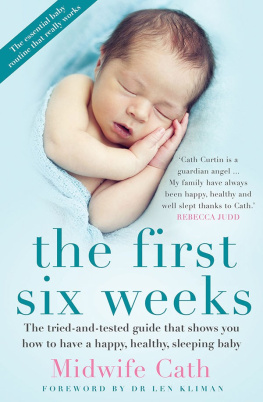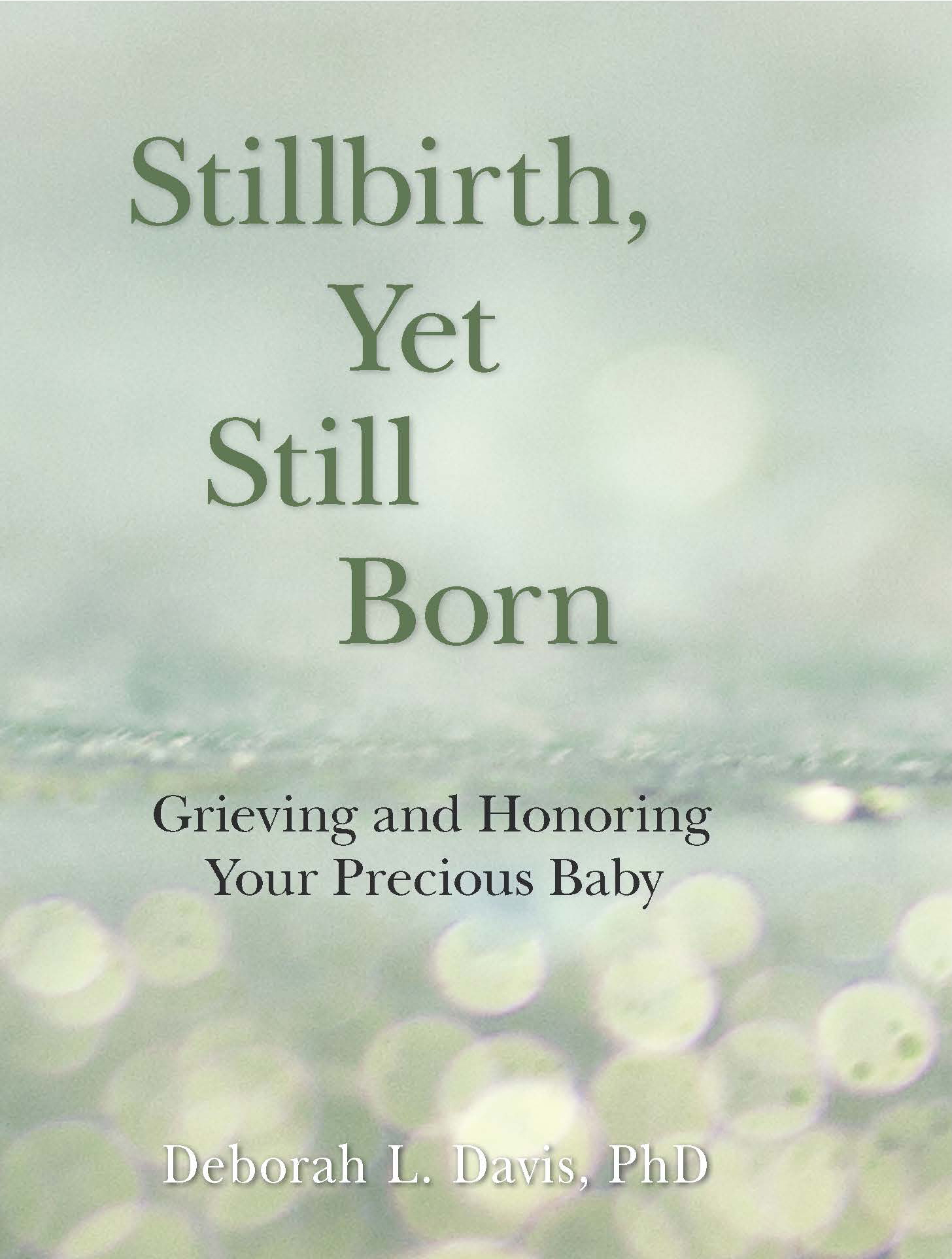Stillbirth,
Yet
Still
Born
Grieving and Honoring Your Precious Baby
Deborah L. Davis, PhD
Author of Empty Cradle, Broken Heart
Copyright 2014 Deborah L. Davis
Originally published in 2000 by the Pregnancy and Infant Loss Center, Wayzata, Minnesota
All rights reserved. No part of this book may be reproduced or transmitted in any form or by any means, electronic or mechanical, including photocopying, recording, or by an information storage and retrieval systemexcept by a reviewer who may quote brief passages in a reviewwithout permission in writing from the publisher.
Library of Congress Cataloging-in-Publication Data
Davis, Deborah L., 1955
Stillbirth, yet still born : grieving and honoring your precious baby / Deborah L. Davis.
pages cm
Summary: This small book offers tailored information and support to accompany parents through the early hours, days, and weeks that follow the death and birth of their beloved baby. It also offers strategies for enduring labor and delivery, and compassionate suggestions for spending time with the little one. Parents will find ideas for affirming and honoring their precious babys life-- Provided by publisher.
ISBN 978-1-938486-33-3 (paperback)
1. Perinatal death--Psychological aspects. 2. Stillbirth--Psychological aspects. 3. Infants--Death--Psychological aspects. 4. Parents--Psychology. I. Title.
RG631.D39 2014
618.392--dc23
2014015083
Printed in the United States of America
0 9 8 7 6 5 4 3 2 1
Designed by Ken Lockwood
Fulcrum Publishing
4690 Table Mountain Dr., Ste. 100
Golden, CO 80403
800-992-2908 303-277-1623
www.fulcrumbooks.com
This book is dedicated to the parents
who contributed to this book;
to their babies;
to your babies.
In loving memory...
Helen Alice Anderson
Carrie Jean Beck
Mia Donegan Buri and Grace Donegan Buri
Stetson Alan Carroll
Morgan Nicole Dahl
Sasha Felix Daly
Gabriel Overend Fortmeyer
Nathan Thomas Genser
Dominick Davis Gustafson
Emmerson Joy Hauschildt
Thor Ehrstine Heineman
Andrew Robert Hill
James Avery Hoskyn
Sarah Elizabeth Johnson
Bryce Neily Martini
Kayla Mae McFarland
Emily Anne Morrison
Oren Jasper Knight Mudrick
David Danielson Nelson
D.J. Nordlund
Kayley Amanda Oak
Rachael Louise Pozza
Laure Pryce
Jacob Walter Ramsperger
Robert Evan Reed
Adam John Ridler
Jenna Louise Robertson
Andrew James Roehl
Grace Elizabeth Roering
Lauren Nicole Schaper
Joshua David Schneider
Finley John Scott
Matthew Talaski
Tiffany Talaski
Pierce Robert VanDerMeer
Joseph David Wilson
Olivia Catherine Wittman
Sarah Rose Yellovich
Lynn Zimmer
World Turned Upside Down
When you find out your baby has died before birth, the world as you know it ceases to exist. Youve likely never experienced anything like this, and it is normal for you to feel stunned, frightened, distraught, and completely unprepared.
Circle of care
In this book, Chapters 4 and 6 in particular, youll find important information and support that can guide you as you prepare to labor, birth, and/or meet your baby. However, it is the rare parent who would feel ready, willing, or able to read anything during this traumatic time. Shocked, distressed, and bereft, you need far more than any book can provide, especially during the first hours and days of this journey.
In the beginning, the most important sources of information and support can be found in the circle of care that surrounds you. In recognition of this, the information in these pages is also intended to be useful to those who make up that circlethe caregivers who are trained to work with grieving parents during this time of greatest need, and the friends and family members who want to know how they can help. It is within the context of those relationships that you will receive compassionate, individualized, supportive bereavement care.
Key information
During the next few weeks or months, as your shock and disbelief subside, you may feel better equipped and able to pick up this book. In the meantime, heres an overview of information you might find helpful within the first few hours and days after finding out your baby has died. It is a list that you, or those around you, can refer to easily whenever you want to know or be reminded of key aspects to the early, and most overwhelming, part of your journey. Whenever you are ready for more information on any of these topics, you can turn to the relevant sections of this book.
Finding out that your baby has died is a devastating and traumatic shock. It is natural to feel numb, disbelieving, confused, horrified, and uncertain how to proceed.
Your babys death is a deeply felt loss, as your bond grew strong before birth.
Like most parents, you will likely want to spend time with your little one after birth. Discuss with your medical team the delivery methods that would best honor your wishes.
If you arent in labor yet, you may choose to be induced immediately, or you may decide to wait overnight or a day or so. As long as youre in good health, there are benefits to waiting, including acquiring information for the impending birth, gathering support people, and devising plans for spending time with your baby, making photographs, and collecting keepsakes.
If you are carrying more than one baby, you can continue to carry the pregnancy to term for the benefit of any surviving baby(ies). After the birth, youll be able to see and hold the baby who died.
You may find it soothing to view labor and birth as sacred transitions and affirmations of motherhood. While laboring and birthing, you and your partner are claiming and honoring your role as parents to this child.
You benefit from having caregivers who engage you in ongoing conversations about your feelings, ideas, questions, and concerns about spending time with your baby. It can also be helpful to hear what other parents have found meaningful and comforting.
Its normal to feel fearful or nervous about meeting your baby. Your caregivers can describe and reassure you about your babys appearance and assist you with the care youd like to provide, at a pace that is comfortable for you.
Examining, cuddling, and caring for your baby are ways you can express your love and nurturing. Later as you grieve and yearn to hold your baby, you can find comfort in these cherished memories of being with your little one.
You can feel heartened when others treat your baby with respect and tenderness.
If you take your baby home until burial or cremation, you get to immerse yourself in your parenting role and experience a tiny morsel of normalcy, which can be soothing.
Whether in hospital or at home, having prolonged contact with your babys body gives you the opportunity to gradually and truly experience it as a lifeless shell, which can help you part with it upon burial or cremation.
Rituals such as providing care to the body, determining a final resting place, funeral or memorial service, and commemoration are all ways of parenting your baby.
You will experience many layers of loss. Its normal to feel as if youve lost a part of yourself and your confidence in the future. You may also notice some people pulling away from you; they may be feeling awkward and unsure of what to say or do.
Let family and friends know what kinds of support you
need. Those who are truly devoted to your well-being will

